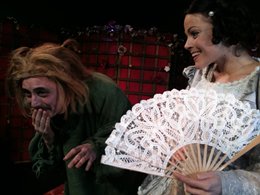Let’s say it clearly: Bewley’s Café Theatre is an undervalued cultural resource in the heart of our capital city; we neglect it at our peril. When it’s good, which is the case with Bairbre Ní Chaoimh’s adaptation of the Wilde story, it’s very, very good. With a cast of three doubling and trebling up to fill the acting space, and with a form of enriched economy of presentation, The Birthday of the Infanta fits the Grafton Street venue perfectly. This is the stuff of ‘little gems’ – more’s the pity that, on the day this reviewer was there, the punters barely outnumbered the players.
We are presented, in miniature, with a world of elegance and stifling decorum pitted against the natural energies and impulses of childhood. But this is no ordinary child: this is the Infanta, only daughter of the King of Spain (you know, the one painted by Velasquez), the pampered princess, a vain little creature. On her birthday, and only then, can she engage, after a fashion, with the ‘real’ world.
Wilde’s work is an ironic study of privilege and over-breeding. The Infanta (Jill Murphy, in a finely observed performance, where she absorbs fully the flounce and petulance of the cosseted child) longs for freedom from the hairbrush and the corset, and for exotic diversion. Murphy conveys the spirit that is struggling to get free of the ties that bind, as the Infanta hurls herself into the puppets and the hide-and-seek games. She exults in the mock bull fight and recoils from the snake-charmer’s reptile. She’s quite a little sensation-seeker. Quick role-changes, a commitment to spare and simple gestures, and a dynamic pace allows the trio of actors to bring this all to life.
 But it’s only the dwarf – the misshapen, exotic beast from the forest, her "very own grotesque" - that successfully combats the deficiencies in the Infanta’s attention-span. Ní Chaoimh allows the language of Wilde’s original story to breathe in the exploration of beauty/ugliness, reflection/reality, the callow toying with emotions versus the penetrating pain of the dwarf’s unrequited love for the Infanta. How does Wilde get away with such blatant pathos, allowing the poor dwarf curl up and die of a broken heart? Is it because he clothes the triteness of the tale in a carapace of descriptive language and fantasy?
But it’s only the dwarf – the misshapen, exotic beast from the forest, her "very own grotesque" - that successfully combats the deficiencies in the Infanta’s attention-span. Ní Chaoimh allows the language of Wilde’s original story to breathe in the exploration of beauty/ugliness, reflection/reality, the callow toying with emotions versus the penetrating pain of the dwarf’s unrequited love for the Infanta. How does Wilde get away with such blatant pathos, allowing the poor dwarf curl up and die of a broken heart? Is it because he clothes the triteness of the tale in a carapace of descriptive language and fantasy?
But there’s also a charm that comes from the cast. While Jill Murphy triumphs in the precocious child department and Natalie Radmall-Quirke carries off the hauteur and elegance of the courtly lady-in-waiting, much is left to Oscar Hernandez Rodriguez. There is an astonishing vivacity about this actor. His Spanish accent lends authenticity; his riveting, intense eyes are the common thread throughout a series of roles. As the widower-monarch he is truly "wedded to sorrow" but never is he more captivating than as the dwarf. He has elasticity and surging energy that commands the tiny stage and auditorium.
It’s this kind of work that demands that Bewley’s must prevail. It’s theatre on a postage stamp, a rare one at that.
Derek West is the Arts & Education Officer of the National Association of Principals and Deputy Principals. He edits the Association’s publications and administers its arts scheme for schools, Creative Engagement.